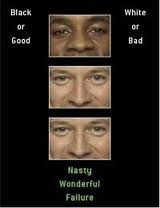Recently, we had a speaker named Mykee Fowlin
come to our school to talk about diversity and the importance of accepting
others. He spoke about how little changes in attitude can make huge impacts on
others and sometimes even change lives. The whole auditorium was moved by his
words; after he was done, many had tears in their eyes.
As my friends and I were discussing the speaker,
one of them questioned the actual impact of his speech. She pointed out that although
he had a beautiful message to tell, most people would only truly take it to heart for one
day and forget his words immediately after. And, to some extent, I completely
agree.
 In the book Blink, Malcolm Gladwell explores the human mind’s
ability to process images and spit out conclusions within a split-second –
essentially, to judge a book by its cover. Of course, stereotypes go hand in
hand with these types of judgments; one particularly compelling example used in the book is a study on racism conducted by Harvard using an Implicit Association
Test (IAT). This test studies the associations that a subject’s brain makes
between positively or negatively connoted words and photographs of black or white
people.
In the book Blink, Malcolm Gladwell explores the human mind’s
ability to process images and spit out conclusions within a split-second –
essentially, to judge a book by its cover. Of course, stereotypes go hand in
hand with these types of judgments; one particularly compelling example used in the book is a study on racism conducted by Harvard using an Implicit Association
Test (IAT). This test studies the associations that a subject’s brain makes
between positively or negatively connoted words and photographs of black or white
people.
I consider myself a very open-minded person -- yet
as I took this test a couple years ago, I found myself deliberately slowing
down my reaction times so that I could ensure a test result that put me in a
good light. The conscious part of my brain desperately hoped that my
subconscious didn’t have any traces of racism in it.
Even the best of people can be quick to judge
others. Sherman Alexie makes this evident through his characters like the 7-11
worker, someone who is generally innocent but suffers from misconceptions about
Native Americans. Stereotyping is something that’s built into us, and it's harder to let go of than it may seem. I know that
the problems associated with stereotypes are not going to disappear in one day.
They are not, by any means, ever going to disappear – where people are
different, there will always be marginalization. In the end, Dr. Fowlin's speech only reminded people of what they already know
about how to treat others, but usually choose to ignore. However, people DO need to be constantly reminded that in
order for them to consciously pursue becoming a better person. Ultimately, although the path to a more tolerant population is an individual
journey, this journey is definitely influenced by literature, pop culture, and whatever else is heard or said in daily life. Simply being exposed to voices that encourage tolerance is, in itself, a positive, if small impact in the larger battle against marginalization.
(In case you're interested, you can take the IAT here: https://implicit.harvard.edu/implicit/)
(In case you're interested, you can take the IAT here: https://implicit.harvard.edu/implicit/)